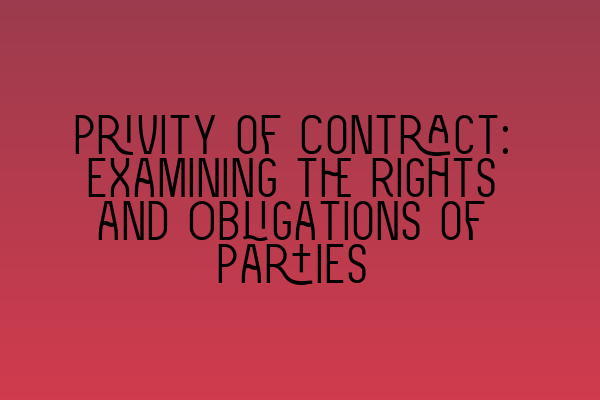Privity of Contract: Examining the Rights and Obligations of Parties
In contract law, the concept of privity of contract refers to the relationship between the parties to a contract. It establishes the rights and obligations that exist between them and plays a vital role in determining their legal standing in any contractual dispute. Understanding privity of contract is essential for solicitors and legal professionals, as it forms the foundation of contract law and governs the enforceability of agreements.
Interested in learning more about contract law? Check out our related article: Navigating Legal Challenges and Pitfalls in Your Practice.
The Principle of Privity of Contract
The principle of privity of contract is based on the idea that only the parties who have entered into a contractual agreement can enforce the terms of that agreement or be held liable for its breach. Any third party who is not a party to the contract generally cannot enforce its terms or claim damages for any breach.
For example, let’s consider a scenario where Company A enters into a contract with Company B to provide services. The agreement specifies the scope of work, payment terms, and deadlines. In this situation, only Company A and Company B have privity of contract, meaning they have the legal relationship necessary to enforce the terms of the agreement.
Curious about the differences between a solicitor and a barrister? Read our comprehensive comparison article: Barrister vs. Solicitor: A Comprehensive Comparison.
Exceptions to the Privity Rule
While the privity rule generally prevents third parties from enforcing a contract, there are several exceptions recognized by the law. These exceptions allow certain third parties to benefit from or be bound by a contract, despite not being a party to it.
One notable exception is when a contract creates a trust in favor of a third party. In such cases, the third party can enforce the terms of the contract as a beneficiary of the trust. Another exception is when a contract contains a term that confers a benefit on a third party, known as a ‘third party beneficiary.’ In this situation, the third party can enforce the contract to obtain the intended benefit.
Are you interested in specializing in a particular area of law? Discover more in our article: Exploring Different Solicitor Specializations: Finding Your Niche.
The Impact of Privity of Contract
Privity of contract has significant implications for the rights and obligations of parties involved. It determines who can sue for breach of contract, who can be sued for breach, and who can claim damages. Understanding the concept of privity is crucial for solicitors in effectively advising their clients and representing them in contractual disputes.
Furthermore, privity of contract also affects the assignment and delegation of contractual rights and obligations. By default, contractual rights and obligations cannot be assigned or delegated to third parties without the consent of all parties involved. This ensures that the original contractual relationship remains intact and prevents unauthorized transfers of rights and obligations.
Considering a career in law? Check out our recommendations for the top law schools in the UK: Top Recommendations for Law Schools in the UK.
Conclusion
Privity of contract is a fundamental principle in contract law that governs the rights and obligations of parties to a contract. It establishes the legal relationship necessary to enforce the terms of an agreement and prohibits third parties from directly benefiting from or being bound by the contract. Understanding privity of contract is essential for solicitors and legal professionals in effectively advising their clients and resolving contractual disputes.
Interested in the changing landscape of legal practices? Read about the rise of virtual law practices: Embracing the Rise of Virtual Law Practices.
For further guidance and advice on privity of contract or other legal matters, consult with an experienced solicitor to ensure you are properly informed and protected.
